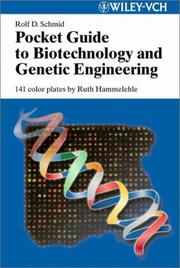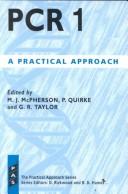| Listing 1 - 4 of 4 |
Sort by
|

ISBN: 3527308954 9783527308958 Year: 2003 Publisher: Weinheim Wiley-VCH
Abstract | Keywords | Export | Availability | Bookmark
 Loading...
Loading...Choose an application
- Reference Manager
- EndNote
- RefWorks (Direct export to RefWorks)
Biotechnology and genetic engineering are the key technologies of the 21st century. They allow the findings in cell biology and genetics, biochemistry and microbiology, biochemical engineering and bioinformatics to be applied to health care, agriculture, food production, environmental protection and alternative production methods for chemicals. This handy book provides broad coverage of the relevant facts on products, methods and applications. It discusses the opportunities and risks involved in these new technologies, combined with ethical, economic and safety considerations. Instructive and attractive color illustrations as well as an excellent didactic approach throughout make this a perfect introduction to the field - for professionals and students alike.
Biotechnology --- Genetic Engineering --- DNA, Recombinant --- Basic Sciences. Biotechnology --- Biotechnology (General) --- Biotechnology (General). --- Macromolecules --- General biochemistry --- Water supply. Water treatment. Water pollution --- ethanol --- gisten --- PCR (polymerase chain reaction) --- bioreactoren --- papierchromatografie --- voedselmicrobiologie --- voedingschemie --- oppervlakte-actieve stoffen --- biosensoren --- proteomics --- waterbehandeling --- bio-informatica --- stamcellen --- bioproducten --- biochemie --- genetica --- waterverontreiniging --- antibiotica --- biotechnologie --- vaccinatie --- DNA (deoxyribonucleic acid) --- klonen --- interferon --- afvalwater --- polymeren --- moleculaire biologie --- chromatografie --- enzymen --- aminozuren
Book
ISBN: 9789814579544 9814579548 Year: 2014 Publisher: New Jersey, N.J. World Scientific
Abstract | Keywords | Export | Availability | Bookmark
 Loading...
Loading...Choose an application
- Reference Manager
- EndNote
- RefWorks (Direct export to RefWorks)
Synthetic biology --- genetica --- polymeren --- Macromolecules --- Genetics --- 57.08 --- 57.08 Biological techniques. Experimental methods. Equipment --- Biological techniques. Experimental methods. Equipment --- Biology --- Engineering --- Bioengineering --- moleculaire biologie --- Molecular biology --- machine learning --- mutageniteit --- Escherichia coli --- electrophoresis --- Escherichia --- PCR (polymerase chain reaction) --- Synthetic biology - Handbooks, manuals, etc. --- Biotechnology

ISBN: 9780470843802 0470843802 0470843799 9780470843796 Year: 2004 Publisher: Chichester Wiley
Abstract | Keywords | Export | Availability | Bookmark
 Loading...
Loading...Choose an application
- Reference Manager
- EndNote
- RefWorks (Direct export to RefWorks)
*Analysis of Genes and Genomes* is a clear introduction to the theoretical and practical basis of genetic engineering, gene cloning and molecular biology. All aspects of genetic engineering in the post-genomic era are covered, beginning with the basics of DNA structure and DNA metabolism. Using an example-driven approach, the fundamentals of creating mutations in DNA, cloning in bacteria, yeast, plants and animals are all clearly presented. Newer technologies such as DNA macro and macroarrays, proteomics and bioinformatics are introduced in later chapters helping students to analyse and understand the vast amounts of data that are now available through genome sequence and function projects. Aimed at students with a basic knowledge of the molecular side of biology, this will be invaluable to those looking to better understand the complexities and capabilities of these important new technologies. - A modern post-genome era introduction to key techniques used in genetic engineering. - An example driven past-to-present approach to allow the experiments of today to be placed in an historical context - Beautifully illustrated in full colour throughout. - Associated website including updates, additional content and illustrations
577.1 --- 577.1 Chemical bases of life. Biochemistry and bio-organic chemistry generally --- Chemical bases of life. Biochemistry and bio-organic chemistry generally --- gisten --- yeast [fungi] --- Genome --- Genetic engineering --- Molecular genetics --- Genetics --- Molecular biology --- Designed genetic change --- Engineering, Genetic --- Gene splicing --- Genetic intervention --- Genetic surgery --- Genetic recombination --- Biotechnology --- Transgenic organisms --- Research&delete& --- Methodology --- moleculaire biologie --- genetica --- Nuclear physics --- polymeren --- Macromolecules --- DNA (deoxyribonucleic acid) --- Genetic Techniques --- DNA --- Research --- analysis --- bio-informatica --- genomics --- stamcellen --- klonen --- mutageniteit --- Escherichia coli --- proteomics --- oligonucleotides --- enzymen --- electrophoresis --- insecten --- Escherichia --- PCR (polymerase chain reaction) --- Molecular genetics - Research - Methodology --- Genetic engineering - Research - Methodology --- DNA - analysis --- Acqui 2006

ISBN: 0199631964 0199634246 0199634254 019963226X 9780199634255 9780199634248 Year: 1992 Publisher: Oxford IRL
Abstract | Keywords | Export | Availability | Bookmark
 Loading...
Loading...Choose an application
- Reference Manager
- EndNote
- RefWorks (Direct export to RefWorks)
PCR (polymerase chain reaction) is now one of the most widely used of basic molecular biology techniques and is an indispensable research tool for the molecular biologist. The basic PCR technique provides the cornerstone for in vitro DNA amplification - allowing the researcher to produce large quantities of DNA from minute amounts of starting material.PCR: A Practical Approach Volume 2 is not a revised version of PCR: A Pracical Approach, but sets out to address some of the exciting new applications fo PCR including cDNA cloning, mRNA quantitation and expression of proteins from PCR products, genomic DNA mapping and fingerprinting, and mutational analysis. The Polymerase Chain Reaction (PCR) has become one of the most widely used techniques in biomedical research, enabling the fast, inexpensive production of large quantities of DNA from minute amounts of starting material. Although the basic procedure is very simple, many variations of it have been developed for different applications, for use in such diverse areas as forensic and diagnostic medicine, genetic engineering, and the food industry. PCR: A Practical Approach provides a general introduction to PCR for researchers new to the area, followed by chapters detailing specific applications of the technique. It covers gene analysis at the level of restriction enzyme polymorphism, point mutation and sequence analysis. Methods for using different source materials - cloned DNA, genomic DNA, RNA, nucleic acid from archive material and PCR products themselves - are given. The emphasis throughout is on the practical applications of the technique and detailed experimental protocols are included at all stages, backed up by advice on avoiding potential pitfalls. This volume provides a starting point for those new to PCR and will also serve as a useful reference for more experienced researchers in all areas of biological science.
General biochemistry --- DNA (deoxyribonucleic acid) --- biochemie --- PCR (polymerase chain reaction) --- genetische informatie --- Molecular biology --- Analytical biochemistry --- biologie --- moleculaire biologie --- polymeren --- Macromolecules --- Gene Amplification --- Réaction en chaîne de la polymérase --- Technique des traceurs --- Tracer techniques --- État physique --- physical states --- Polymerase Chain Reaction. --- -Chain reaction, Polymerase --- PCR (Biochemistry) --- DNA polymerases --- Amplification, Gene --- Anchored Polymerase Chain Reaction --- Inverse Polymerase Chain Reaction --- Nested Polymerase Chain Reaction --- Anchored PCR --- Inverse PCR --- Nested PCR --- PCR, Anchored --- PCR, Inverse --- PCR, Nested --- Polymerase Chain Reactions --- Reaction, Polymerase Chain --- Reactions, Polymerase Chain --- Ligase Chain Reaction --- -Molecular bases of life. Molecular biology --- -577.2 Molecular bases of life. Molecular biology --- Chain reaction, Polymerase --- Réaction en chaîne de la polymérase --- Polymerase chain reaction --- DNA Replication --- Polymerase Chain Reaction --- 577.2 --- 577.2 Molecular bases of life. Molecular biology --- Molecular bases of life. Molecular biology --- PCR --- Replication, Autonomous --- Autonomous Replication --- Autonomous Replications --- DNA Replications --- Replication, DNA --- Replications, Autonomous --- Replications, DNA --- DNA-Binding Proteins --- Virus Replication --- S Phase --- Laboratory manuals --- #WSCH:WBIO --- Polymerization --- methods --- Laboratory manuals. --- Polymerase chain reaction. --- Dna replication. --- Gene amplification. --- DNA Replication. --- Gene Amplification. --- klonen --- enzymen --- Polymerase chain reaction - Laboratory manuals. --- Genes
| Listing 1 - 4 of 4 |
Sort by
|

 Search
Search Feedback
Feedback About UniCat
About UniCat  Help
Help News
News